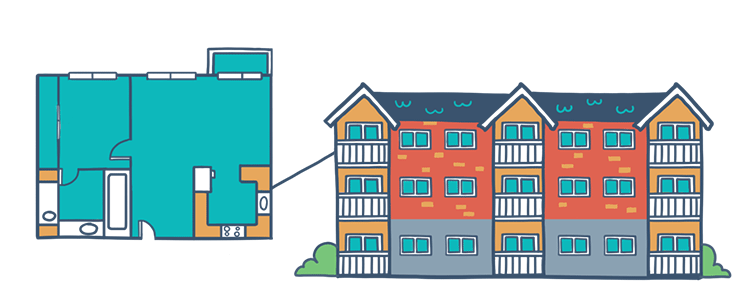FHA Condominium Loan

Condominium ownership is a non-conventional form of homeowning that is becoming more and more popular. Condominiums, or condos, are developments in which separate owners of individual units mutually own the common areas and facilities (such as pools and clubhouses). In an effort to encourage more Americans to take part in the housing market, the FHA insures condominium loans under Section 234(c) and encourages lenders to finance these purchases. Having these loans backed by the FHA is very important for low- and moderate-income renters who wish to avoid the risk of being displaced when their apartments are converted into condominiums.
Property Eligibility
Under the Section 234(c) program, the FHA insures a 30-year loan to purchase a unit in a condominium building. The building must contain at least four dwelling units and can be comprised of detached and semidetached units, row houses, walkups, or an elevator structure. The units must be used for residential purposes, not investment or business related. The development must also be "FHA-approved."
For a condominium project to be approved for an FHA-insured home loan, "the project must have been declared and exists in full compliance with applicable State law requirements of the jurisdiction in which the condominium project is located and with all other applicable laws and regulations."
If it is not an FHA-approved condominium project, it must be a project that meets the Single-Unit Approval requirements. The condominium project must also meet the requirements established by HUD through the SF Handbook 4000.1, including insurance coverage, financial condition, nature of title, the existence of any pending legal action or physical property condition, and other factors that may affect the viability or marketability of the project or its units.
If you are interested in purchasing a condo, the FHA updates its approved list of condominium projects regularly.

FHA Loan Articles
August 10, 2023FHA loans have specific rules and requirements for borrowers who have filed for bankruptcy. The guidelines can change over time, so it's essential to consult with a qualified lender or FHA-approved counselor for the most up-to-date information.
August 3, 2023FHA loans are primarily designed to help individuals and families purchase homes for use as their primary residences. Rules for these loans generally discourage their use for investment properties or rentals. However, there are exceptions that come with strict rules.
July 29, 2023One crucial aspect of FHA loans that borrowers need to understand thoroughly is debt ratios. In this article, we look at how they can impact your ability to secure financing for your dream home. Debt ratios help lenders understand a borrower's creditworthiness and any risks associated with the loan.
July 21, 2023Investing in a multi-unit property can be an excellent way to build wealth through rental income and property appreciation. FHA multi-unit property loans make this opportunity more accessible to a broader range of individuals. You must occupy a unit as your primary residence within 60 days of closing the loan.
July 15, 2023To qualify for an FHA loan, you must meet certain employment requirements. In this article, we'll dig into the FHA loan employment requirements so that you can understand what's needed to get approved for this type of mortgage.
July 7, 2023Manufactured homes, sometimes referred to as mobile or modular homes, are factory-built residences designed to meet or exceed national building codes set HUD. They offer cost savings and energy efficiency, making them an attractive housing option for many Americans.








